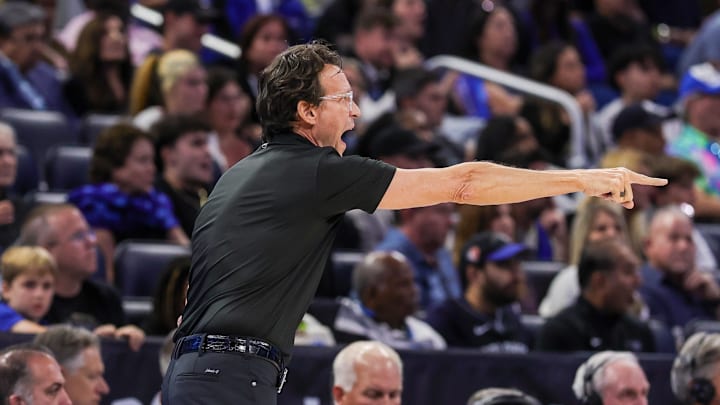The 2021 Jazz were a force to be reckoned with during the regular season.
Winning 52 games in a shortened NBA season, while only dropping 20 games the entire year, the team was poised to dominate in the playoffs in the same fashion as they had done all regular season long. Unfortunately for coach Quin Snyder, the Los Angeles Clippers had other ideas.
Rudy Gobert - a towering, slow defensive anchor - was an incredibly important piece of the contender that Snyder commanded. His interior presence, consistency, and rebounding prowess allowed the Jazz to methodically command game after game, as well as providing an elite pick-and-roll combination with star guard Donovan Mitchell and floor general Mike Conley.
The Clippers decimated the Jazz by running a brand of small ball, attacking Rudy at every turn. On the other end of the floor, Gobert's lack of a serious post/interior game (especially his often break-a-mirror bad touch around the rim) killed their hopes at exploiting the Clippers' lack of interior size.
While the Jazz's wings - Bojan Bogdanovic and Joe Ingles - were (at times) able to provide sparks to ignite the team to victory, they often lacked elite perimeter defense/weakside rim protection abilities, leaving Gobert high and dry on the interior.
Sound familiar?
This year's Hawks bear a striking resemblance to the 2021 Jazz - save for one key aspect.
Position by position, Snyder's 2021 Jazz are eerily similar to this year's Hawks, headlined by the Gobert-Porzingis comparison and the Young-Mitchell similarity. What this year's Hawks have, however, is significant wing depth that the Jazz sorely lacked.
While Snyder's Jazz were lucky to have Bogdanovic and Ingles to flash burst scoring, they were sorely bereft of wing stoppers. Over and over again, the 2021 Clippers blew by their forwards, leaving Gobert on an island. This year's Hawks have too many weapons to count in the realm of POA stoppers.
Dyson Daniels, Nickeil Alexander-Walker, Zaccharie Risacher, and Jalen Johnson are all capable on-ball defenders and/or lengthy weakside rim protectors. Their ability to plug the gaps that plagued the 2021 Jazz is incredible, and will certainly bail out Kristaps Porzingis in ways that Gobert could only wish for.
If Quin Snyder is to avoid the same playoff collapse this year, however, the key lies not in his personnel's defensive abilities (plentiful though they are) - it lies in allowing the Hawks' communal offense to flourish.
Trae Young has long been a heliocentric engine. This year, however, the Hawks gained an influx of talent rivaled by very, very few teams in recent history - the addition of two elite 3-point shooters in NAW and Kennard, the addition of an elite three point titan in The Unicorn, and the drafting of an apparently NBA-ready rookie Asa Newell now round out a supporting cast that can bear a massive offensive load.
As the 2025 Thunder and Pacers showed, the alpha of the offense doesn't have to always be the 1A in any given playoff game. Sure, SGA and Haliburton were often the dominant threat - but that didn't mean any given player couldn't step up to provide 30 points in a big way on any given night.
This year's Hawks are capable of far more than the 2021 Jazz because of how ridiculously deep their scoring potential is. Aside from Trae Young, the Hawks roster many 30-point capable options - Jalen Johnson and Kristaps Porzingis are nightly threats, while Dyson Daniels, Luke Kennard, Zaccharie Risacher, and Nickeil Alexander-Walker can all get hot at the right time.
If Atlanta is to make a deep playoff run, Quin Snyder has to place a level of trust in his ancillary scoring options and instill the same level of trust in Trae Young for his teammates that he must carry himself. If the team can build trust from the inside out and carry it into the postseason, their unselfish play and take-what-the-defense-gives-you approach will be ludicrously difficult to stop.
